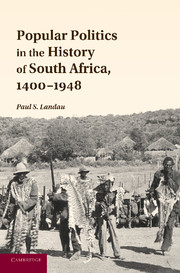Book contents
- Frontmatter
- Contents
- List of Figures
- Preface: The Birth of the Political
- Acknowledgments
- 1 Eyewitness Engagements (Highveld political discourse at the start of the 1800s)
- 2 History before Tribes (Partnership, alliance, and power)
- 3 Translations (Missionaries and the invention of Christianity)
- 4 The Incipient Order (Moroka's reign, 1828–1880)
- 5 Mixed People (The Samuelites, the Griqua, and other subjectivities, 1880–1928)
- 6 Twentieth-Century Tribes
- Primary and Archival Sources
- Bibliography
- Index
- References
5 - Mixed People (The Samuelites, the Griqua, and other subjectivities, 1880–1928)
Published online by Cambridge University Press: 04 August 2010
- Frontmatter
- Contents
- List of Figures
- Preface: The Birth of the Political
- Acknowledgments
- 1 Eyewitness Engagements (Highveld political discourse at the start of the 1800s)
- 2 History before Tribes (Partnership, alliance, and power)
- 3 Translations (Missionaries and the invention of Christianity)
- 4 The Incipient Order (Moroka's reign, 1828–1880)
- 5 Mixed People (The Samuelites, the Griqua, and other subjectivities, 1880–1928)
- 6 Twentieth-Century Tribes
- Primary and Archival Sources
- Bibliography
- Index
- References
Summary
President Brand's decision to award the chief's court to Tshipinare did not resolve the crisis at Thaba Nchu. It did, however, give Tshipinare time to legalize his control of land in terms of Orange Free State law. In fact, he set in motion a strategic program to secure his chiefdom under white colonial authority. He would create an aristocracy of patriarchs to own land, replacing all other political formations; and he would try to prevent his landlords from reselling their farms to outsiders.
Meanwhile the Reverend John Daniel complained darkly of a popular movement against this transformation. He pointed to “some dissatisfied and designing men” who were trying to “raise a rebellion in the country,” and said the “rebels” included “more than half of our [Methodist Church] members.” Adopting an unusual tone, Daniel wrote that “the numerical superiority of the rebels threatened for a time to [crush all] opposition & revolutionize the country.” The nature of the country was changing; free movement was a memory. A nonethnic and nontribal alliance was formed in this context under the leadership of Samuel Moroka in Thaba Nchu. The Samuelites stood against the forces of European and African landlordism fronted by Tshipinare.
Nonetheless, Samuel first rode to Bloemfontein with Father Crisp to see President Johannes Brand and beg him to change his mind and install him as chief. Brand was out of town, and Samuel was shown no special treatment.
- Type
- Chapter
- Information
- Popular Politics in the History of South Africa, 1400–1948 , pp. 162 - 213Publisher: Cambridge University PressPrint publication year: 2010



